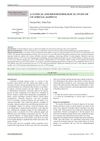 11 citations,
October 2015 in “Clinical and Experimental Dermatology”
11 citations,
October 2015 in “Clinical and Experimental Dermatology” Sophora flavescens extract helps hair growth and treats hair loss.
 9 citations,
November 2019 in “Scientific reports”
9 citations,
November 2019 in “Scientific reports” The AC 2 peptide from Trapa japonica fruit helps protect hair cells and may treat hair loss.
 9 citations,
April 2019 in “International journal of molecular sciences”
9 citations,
April 2019 in “International journal of molecular sciences” Human hair grows better in a special gel that mimics skin.
[object Object]  9 citations,
February 2014 in “Tissue Engineering and Regenerative Medicine”
9 citations,
February 2014 in “Tissue Engineering and Regenerative Medicine” Conditioned media from human amniotic fluid-derived stem cells helps skin heal and protects against aging from sun exposure.
 8 citations,
May 2021 in “Bioengineering & translational medicine”
8 citations,
May 2021 in “Bioengineering & translational medicine” Hair growth environment recreated with challenges; stem cells make successful skin organoids.
 8 citations,
April 2011 in “Surgery today”
8 citations,
April 2011 in “Surgery today” A substance called sodium zinc dihydrolipoylhistidinate can significantly reduce hair loss caused by chemotherapy in rats.
 7 citations,
April 2013 in “Clinical and Experimental Dermatology”
7 citations,
April 2013 in “Clinical and Experimental Dermatology” Tianeptine, an antidepressant, may prevent stress-induced hair loss in mice.
 5 citations,
July 2013 in “Our Dermatology Online”
5 citations,
July 2013 in “Our Dermatology Online” Lichen planopilaris is the most common type of scarring hair loss observed, with a variety of symptoms and tissue changes.
[object Object]  4 citations,
January 2021 in “in Vivo”
4 citations,
January 2021 in “in Vivo” Scoparone may help stimulate hair growth by increasing stem cell-related proteins in skin cells.
 4 citations,
December 2020 in “Mammalian genome”
4 citations,
December 2020 in “Mammalian genome” Harlequin mutant mice have hair loss due to low AIF protein levels and retroviral element activity.
 3 citations,
February 2021 in “bioRxiv (Cold Spring Harbor Laboratory)”
3 citations,
February 2021 in “bioRxiv (Cold Spring Harbor Laboratory)” Adult esophageal cells can start to become like skin cells, with a key pathway influencing this change.
 3 citations,
January 2019 in “Jikken doubutsu ihou/Jikken doubutsu/Experimental animals/Jikken Dobutsu”
3 citations,
January 2019 in “Jikken doubutsu ihou/Jikken doubutsu/Experimental animals/Jikken Dobutsu” Pigs without the Hairless gene showed skin and thymus changes, useful for studying human hair disorders.
 3 citations,
November 2011 in “European Journal of Dermatology”
3 citations,
November 2011 in “European Journal of Dermatology” 4-O-methylhonokiol from Magnolia officinalis significantly promotes hair growth.
 2 citations,
May 2023 in “bioRxiv (Cold Spring Harbor Laboratory)”
2 citations,
May 2023 in “bioRxiv (Cold Spring Harbor Laboratory)” Sebaceous glands can heal and regenerate after injury using their own stem cells and help from hair follicle cells.
 1 citations,
September 2023 in “Clinical, cosmetic and investigational dermatology”
1 citations,
September 2023 in “Clinical, cosmetic and investigational dermatology” Certain genetic variants linked to immune response increase the risk of alopecia areata in Taiwanese people.
 1 citations,
September 2022 in “The journal of investigative dermatology/Journal of investigative dermatology”
1 citations,
September 2022 in “The journal of investigative dermatology/Journal of investigative dermatology” MicroRNA-148a is crucial for maintaining healthy skin and hair growth by affecting stem cell functions.
 1 citations,
September 2011 in “Journal of Dermatology”
1 citations,
September 2011 in “Journal of Dermatology” A woman with a new PTCH gene mutation has both Gorlin syndrome and severe hair loss.
 September 2024 in “Stem Cell Research & Therapy”
September 2024 in “Stem Cell Research & Therapy” HA-stimulated stem cell vesicles improved hair growth in male mice with androgenetic alopecia.
 May 2024 in “Clinical Cosmetic and Investigational Dermatology”
May 2024 in “Clinical Cosmetic and Investigational Dermatology” Manipulating cell cleanup processes could help treat hair loss.
 April 2024 in “Applied biological chemistry”
April 2024 in “Applied biological chemistry” Piperine from black pepper can make hair less oily by blocking fat cell development in hair roots.
 January 2024 in “Journal of tissue engineering”
January 2024 in “Journal of tissue engineering” Sunlight exposure damages hair follicles, but certain stem cell-derived particles can reduce this damage and help with hair regeneration.
 November 2023 in “npj regenerative medicine”
November 2023 in “npj regenerative medicine” Skin spheroids with both outer and inner layers are key for regrowing skin patterns and hair.
 September 2023 in “Research Square (Research Square)”
September 2023 in “Research Square (Research Square)” TNC+ fibroblasts play a key role in skin inflammation by interacting with T cells.
 May 2023 in “Cytotherapy”
May 2023 in “Cytotherapy” Hair follicle and adipose cell vesicles both protect neurons and reduce inflammation similarly.
 January 2023 in “Open Life Sciences”
January 2023 in “Open Life Sciences” VEGFR-2 activation is likely involved in hair follicle growth, survival, and development.
 December 2022 in “Acta Ophthalmologica”
December 2022 in “Acta Ophthalmologica” Dutasteride potentially improves cell survival and reduces retinal damage in retinitis pigmentosa.
 May 2022 in “Pharmacognosy journal”
May 2022 in “Pharmacognosy journal” Moringa seed oil may help prevent hair loss and promote hair growth.

The document concludes that the development of certain tumors is influenced by genetic background and that a specific gene modification can lead to tumor regression and reduced growth.
 September 2021 in “Research Square (Research Square)”
September 2021 in “Research Square (Research Square)” Not having enough or having too much of the protein Grainyhead-like 3 leads to various developmental problems.
 August 2019 in “Journal of Invertebrate Pathology”
August 2019 in “Journal of Invertebrate Pathology” Thymosin beta 4 protects cells from damage by blocking a harmful microRNA and boosting a protective gene.





























